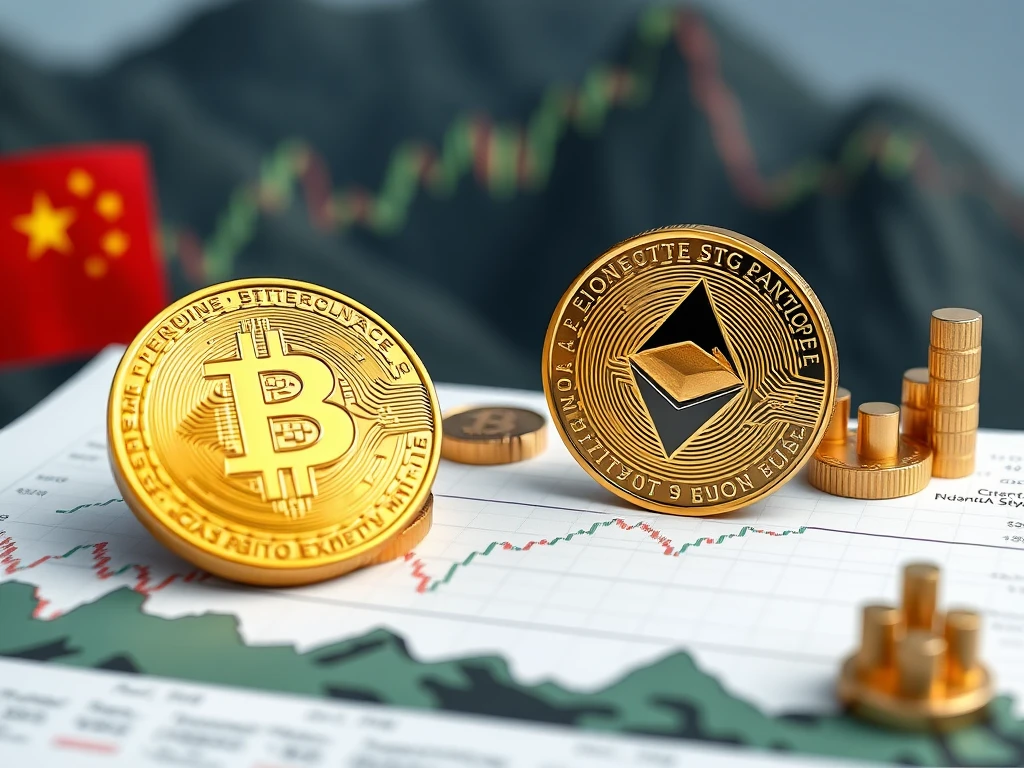Positive Bitcoin Price Reaction: Inflation Cools & US-China Tariffs Roll Back

Cryptocurrency investors are closely watching global economic signals, and recent news regarding inflation and trade tensions has sparked a notable reaction in the market. The latest data points suggest a potentially positive shift for assets like Bitcoin and Ethereum.
Inflation Cools: What Does This Mean for Bitcoin Price?
The US Consumer Price Index (CPI) report brought a degree of relief, showing an annual inflation rate of 2.4%. This figure is lower than some expectations, particularly against the backdrop of ongoing global trade discussions. Traditionally, lower inflation might reduce the appeal of assets like Bitcoin as an inflation hedge. However, the Bitcoin price showed strength, nearing $109,000 following the report. This suggests that other factors might be influencing market sentiment more significantly at this time.
Easing Tensions: Impact of US-China Tariffs Roll Back
Adding to the positive sentiment was news of a potential rollback in US-China tariffs. US President Donald Trump announced a new trade agreement intended to reduce tariffs to levels seen in February 2025. Easing trade tensions typically lowers economic risk and could boost traditional markets. While the stock market response was somewhat muted, the cryptocurrency market, including the Ethereum price, saw gains. ETH posted a 3% increase, trading above $2,800. This indicates that crypto assets might be reacting differently to macroeconomic shifts compared to traditional equities, potentially benefiting from reduced global economic friction.
Market Analysis Amidst Economic Concerns
Despite the positive reaction to cooling inflation and reduced US-China tariffs, underlying economic concerns persist. The growing US government debt remains a significant point of unease for investors. The US Dollar Index (DXY) recently fell to a seven-week low, suggesting investors are moving away from the dollar, possibly due to concerns about the Federal Reserve’s ability to manage economic risks and the country’s fiscal health. This retreat from the dollar can sometimes benefit alternative assets, including cryptocurrencies.
Financial leaders like JPMorgan Chase CEO Jamie Dimon have also highlighted potential risks, such as those in private credit, particularly in the event of an economic downturn. Predictions of a potential recession, coupled with persistent upward inflationary pressure and expectations of employment cooling, contribute to a cautious economic outlook. Experts note that the lack of robust economic growth remains a primary concern, and the longer the Federal Reserve maintains current interest rates, the higher the likelihood of a recession.
Fed Rate Uncertainty and Crypto’s Position
The future trajectory of interest rates set by the Federal Reserve is a key factor influencing market sentiment. According to the CME FedWatch tool, market expectations for year-end interest rates have shifted, with a higher probability now assigned to rates being 3.75% or higher by December compared to a month ago. Higher interest rates generally make borrowing more expensive and can weigh on risk-on assets as fixed-income investments become more attractive.
However, the recent performance of Bitcoin price and Ethereum price suggests a potential decoupling from traditional assets. Investors might be seeking higher returns or alternative stores of value in an environment where the US government appears prepared to raise the debt ceiling. This scenario could lead to expectations of increased liquidity from central banks, which is often seen as a positive driver for cryptocurrency markets. This ongoing market analysis indicates that while traditional economic indicators present mixed signals, cryptocurrencies are finding support from unique market dynamics and investor expectations.
Summary
The cryptocurrency market has shown resilience, with Bitcoin and Ethereum prices reacting positively to recent economic news like cooling inflation and the potential rollback of US-China tariffs. Despite lingering concerns about US debt, recession risks, and Fed rate uncertainty, the market’s response suggests that crypto assets may be increasingly influenced by factors such as the search for alternative returns and expectations of future liquidity. This dynamic environment highlights the evolving position of cryptocurrencies within the broader financial landscape.







